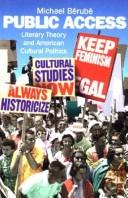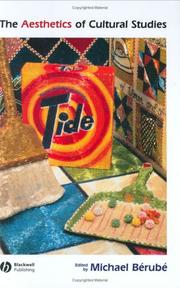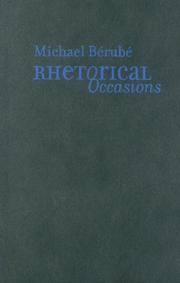| Listing 1 - 10 of 23 | << page >> |
Sort by
|

ISBN: 0860916782 0860914240 Year: 1994 Publisher: London New York Verso
Abstract | Keywords | Export | Availability | Bookmark
 Loading...
Loading...Choose an application
- Reference Manager
- EndNote
- RefWorks (Direct export to RefWorks)
American literature --- Sociology of cultural policy --- United States --- 316.752 <73> --- 316.323.9 <73> --- 316.423.066 <73> --- #KVHA:Cultuur; Verenigde Staten --- #KVHA:American Studies --- Criticism --- -Culture --- -Politics and literature --- -American literature --- -Literature --- -Belles-lettres --- Western literature (Western countries) --- World literature --- Philology --- Authors --- Authorship --- English literature --- Agrarians (Group of writers) --- Cultural sociology --- Culture --- Sociology of culture --- Civilization --- Appraisal of books --- Books --- Evaluation of literature --- Literary criticism --- Literature --- Rhetoric --- Aesthetics --- Style, Literary --- Literature and politics --- Waarden --(sociologie)--Verenigde Staten van Amerika. VSA. USA --- Postmoderne maatschappij. Sociologie van het postmodernisme--Verenigde Staten van Amerika. VSA. USA --- Sociale mobilisatie--Verenigde Staten van Amerika. VSA. USA --- Political aspects --- -History --- -Political aspects --- -History and criticism --- -Theory, etc --- History and criticism --- Social aspects --- Appraisal --- Technique --- Evaluation --- Politics and culture --- Politics and literature --- Theory, etc. --- History --- -Waarden --(sociologie)--Verenigde Staten van Amerika. VSA. USA --- 316.423.066 <73> Sociale mobilisatie--Verenigde Staten van Amerika. VSA. USA --- 316.323.9 <73> Postmoderne maatschappij. Sociologie van het postmodernisme--Verenigde Staten van Amerika. VSA. USA --- 316.752 <73> Waarden --(sociologie)--Verenigde Staten van Amerika. VSA. USA --- Belles-lettres --- History and criticism&delete& --- Theory, etc --- 20th century --- Criticism - Political aspects - United States - History - 20th century. --- Culture - Political aspects - United States - History - 20th century. --- Literature History and criticism --- United States of America

ISBN: 0631223053 0631223061 9780631223061 9780631223054 Year: 2005 Publisher: Malden: Blackwell,
Abstract | Keywords | Export | Availability | Bookmark
 Loading...
Loading...Choose an application
- Reference Manager
- EndNote
- RefWorks (Direct export to RefWorks)
Aesthetics --- Culture --- #SBIB:052.AANKOOP --- #SBIB:309H040 --- #SBIB:316.7C120 --- #SBIB:316.7C140 --- Populaire cultuur algemeen --- Cultuursociologie: algemene en theoretische werken --- Cultuursociologie: cultuur en globale samenlevingen --- Aesthetics. --- Culture. --- Cultural sociology --- Sociology of culture --- Civilization --- Popular culture --- Beautiful, The --- Beauty --- Esthetics --- Taste (Aesthetics) --- Philosophy --- Art --- Criticism --- Literature --- Proportion --- Symmetry --- Social aspects --- Psychology --- Radio broadcasting Aesthetics

ISBN: 0807877387 9780807877388 0807830674 9780807830673 0807857777 9780807857779 9798890881458 Year: 2006 Publisher: Chapel Hill : University of North Carolina Press,
Abstract | Keywords | Export | Availability | Bookmark
 Loading...
Loading...Choose an application
- Reference Manager
- EndNote
- RefWorks (Direct export to RefWorks)
Collects twenty-four of the author's major essays and reviews, as well as a sampling of entries on literary theory and contemporary culture from his award-winning weblog. This work offers an array of interventions into matters - academic and nonacademic.
Humanities --- Learning and scholarship --- Popular culture --- Criticism --- September 11 Terrorist Attacks, 2001 --- New Left --- Rhetoric --- Blogs --- Blogging --- Web logs --- Weblogs --- Diaries --- Social media --- Web sites --- Citizen journalism --- Language and languages --- Speaking --- Authorship --- Expression --- Literary style --- Classical education --- Influence. --- Sokal, Alan D., --- United States --- Study and teaching.
Book
ISBN: 147987485X 9781479874859 9781479823611 1479823619 Year: 2016 Publisher: New York : Baltimore, Md. : New York University Press, Project MUSE,
Abstract | Keywords | Export | Availability | Bookmark
 Loading...
Loading...Choose an application
- Reference Manager
- EndNote
- RefWorks (Direct export to RefWorks)
How an understanding of intellectual disability transforms the pleasures of readingNarrative informs everything we think, do, plan, remember, and imagine. We tell stories and we listen to stories, gauging their “well-formedness” within a couple of years of learning to walk and talk. Some argue that the capacity to understand narrative is innate to our species; others claim that while that might be so, the invention of writing then re-wired our brains. In The Secret Life of Stories, Michael Bérubé tells a dramatically different tale, in a compelling account of how an understanding of intellectual disability can transform our understanding of narrative. Instead of focusing on characters with disabilities, he shows how ideas about intellectual disability inform an astonishingly wide array of narrative strategies, providing a new and startling way of thinking through questions of time, self-reflexivity, and motive in the experience of reading. Interweaving his own stories with readings of such texts as Faulkner’s The Sound and the Fury, Haddon’s The Curious Incident of the Dog in the Night-Time, Kingston’s The Woman Warrior, and Philip K. Dick’s Martian Time-Slip, Bérubé puts his theory into practice, stretching the purview of the study of literature and the role of disability studies within it.Armed only with the tools of close reading, Bérubé demonstrates the immensely generative possibilities in the ways disability is deployed within fiction, finding in them powerful meditations on what it means to be a social being, a sentient creature with an awareness of mortality and causality—and sentience itself. Persuasive and witty, Michael Bérubé engages Harry Potter fans and scholars of literature alike. For all readers, The Secret Life of Stories will fundamentally change the way we think about the way we read.
Disability studies. --- Narration (Rhetoric) --- Reading disability. --- Sociology of disability. --- LITERARY CRITICISM / Books & Reading. --- Disabilities --- Sociology of disablement --- Sociology of impairment --- People with disabilities --- Reading disabilities --- Reading retardation --- Retarded readers --- Learning disabilities --- Narrative (Rhetoric) --- Narrative writing --- Rhetoric --- Discourse analysis, Narrative --- Narratees (Rhetoric) --- Sociology of disability --- Education --- Sociological aspects --- Study and teaching --- Curricula
Book
Year: 2002 Publisher: Baltimore (Md.): Johns Hopkins University press,
Abstract | Keywords | Export | Availability | Bookmark
 Loading...
Loading...Choose an application
- Reference Manager
- EndNote
- RefWorks (Direct export to RefWorks)
Postmodernism (Literature) --- English literature --- Postcolonialism (Literature)
Book
ISBN: 9781479832736 Year: 2016 Publisher: New York New York University Press
Abstract | Keywords | Export | Availability | Bookmark
 Loading...
Loading...Choose an application
- Reference Manager
- EndNote
- RefWorks (Direct export to RefWorks)
Narrative informs everything we think, do, plan, remember, and imagine. We tell stories and we listen to stories, gauging their "well-formedness" within a couple of years of learning to walk and talk. Some argue that the capacity to understand narrative is innate to our species; others claim that while that might be so, the invention of writing then re-wired our brains. In The Secret Life of Stories, Michael Bérubé tells a dramatically different tale, in a compelling account of how an understanding of intellectual disability can transform our understanding of narrative. Instead of focusing on characters with disabilities, he shows how ideas about intellectual disability inform an astonishingly wide array of narrative strategies, providing a new and startling way of thinking through questions of time, self-reflexivity, and motive in the experience of reading. Interweaving his own stories with readings of such texts as Faulkner's The Sound and the Fury, Haddon's The Curious Incident of the Dog in the Night-Time, Kingston's The Woman Warrior, and Philip K. Dick's Martian Time-Slip, Bérubé puts his theory into practice, stretching the purview of the study of literature and the role of disability studies within it. Armed only with the tools of close reading, Bérubé demonstrates the immensely generative possibilities in the ways disability is deployed within fiction, finding in them powerful meditations on what it means to be a social being, a sentient creature with an awareness of mortality and causality--and sentience itself. Persuasive and witty, Michael Bérubé engages Harry Potter fans and scholars of literature alike. For all readers, The Secret Life of Stories will fundamentally change the way we think about the way we read.--Publisher website.
Narration (Rhetoric) --- Reading disability --- Disability studies --- Sociology of disability
Book
ISBN: 9780814739051 Year: 2009 Publisher: New York, NY
Abstract | Keywords | Export | Availability | Bookmark
 Loading...
Loading...Choose an application
- Reference Manager
- EndNote
- RefWorks (Direct export to RefWorks)
Book
ISBN: 9780231215046 9780231215053 Year: 2024 Publisher: New York : Columbia University Press,
Abstract | Keywords | Export | Availability | Bookmark
 Loading...
Loading...Choose an application
- Reference Manager
- EndNote
- RefWorks (Direct export to RefWorks)
The "what-will-become-of-us genre" is a distinctive feature of the post-World War II literary landscape, for the obvious reason that with World War II humans achieved the power to destroy themselves-and the awful awareness of that power. Perhaps no genre has focused on the collapse of civilization or the destruction on man so insistently and so imaginatively as science fiction. Increasingly, science fiction has been read in ways that speak to environmental threats and the effects of the Anthropocene. In this sense, science fiction, as Michael Berube argues, offers a radical interpretation of the human - one that challenges our species parochialism not only from the perspective of some greater galactic alien or universal intelligence but from the perspective of the world we share from the living creatures we already know. In Ex-Human, Michael Berube, who teaches a very popular science fiction class, discusses a variety of novels and films and how they respond to the question of what will become of us as a species-and whether one can fruitfully imagine the world without us. Writers and works discussed include Ursula K. Le Guin, Octavia Butler, Liu Cixin, Margaret Atwood, The Matrix, 2001, and Blade Runner. Drawing on his interpretations of the novels and films and the responses of other readers and viewers, including his students, Berube provides a lively yet sobering account of how science fiction imagines the end of the planet with our without humans.
Digital
ISBN: 9780814739051 Year: 2009 Publisher: New York, N.Y. New York University Press
Abstract | Keywords | Export | Availability | Bookmark
 Loading...
Loading...Choose an application
- Reference Manager
- EndNote
- RefWorks (Direct export to RefWorks)
Digital
ISBN: 9781479874859 9781479823611 Year: 2016 Publisher: New York, N.Y. New York University Press
Abstract | Keywords | Export | Availability | Bookmark
 Loading...
Loading...Choose an application
- Reference Manager
- EndNote
- RefWorks (Direct export to RefWorks)
| Listing 1 - 10 of 23 | << page >> |
Sort by
|

 Search
Search Feedback
Feedback About UniCat
About UniCat  Help
Help News
News